Analyzing Auditor Independence, Expectation Gap & Audit Quality
VerifiedAdded on 2023/04/23
|9
|3262
|170
Essay
AI Summary
This essay delves into the critical aspects of audit quality, emphasizing the significance of auditor independence and the impact of the audit expectation gap. It assesses how factors such as adherence to regulations, professional knowledge, and ethical considerations influence audit quality. The analysis reveals that auditor independence can be compromised by the provision of non-audit services and long-standing auditor-client relationships, potentially reducing audit quality. The essay also addresses the audit expectation gap, highlighting issues such as a lack of professional skepticism and self-interest among auditors as contributing factors. Ultimately, the study underscores the necessity of maintaining auditor independence and addressing the audit expectation gap to ensure the reliability and integrity of financial statements.
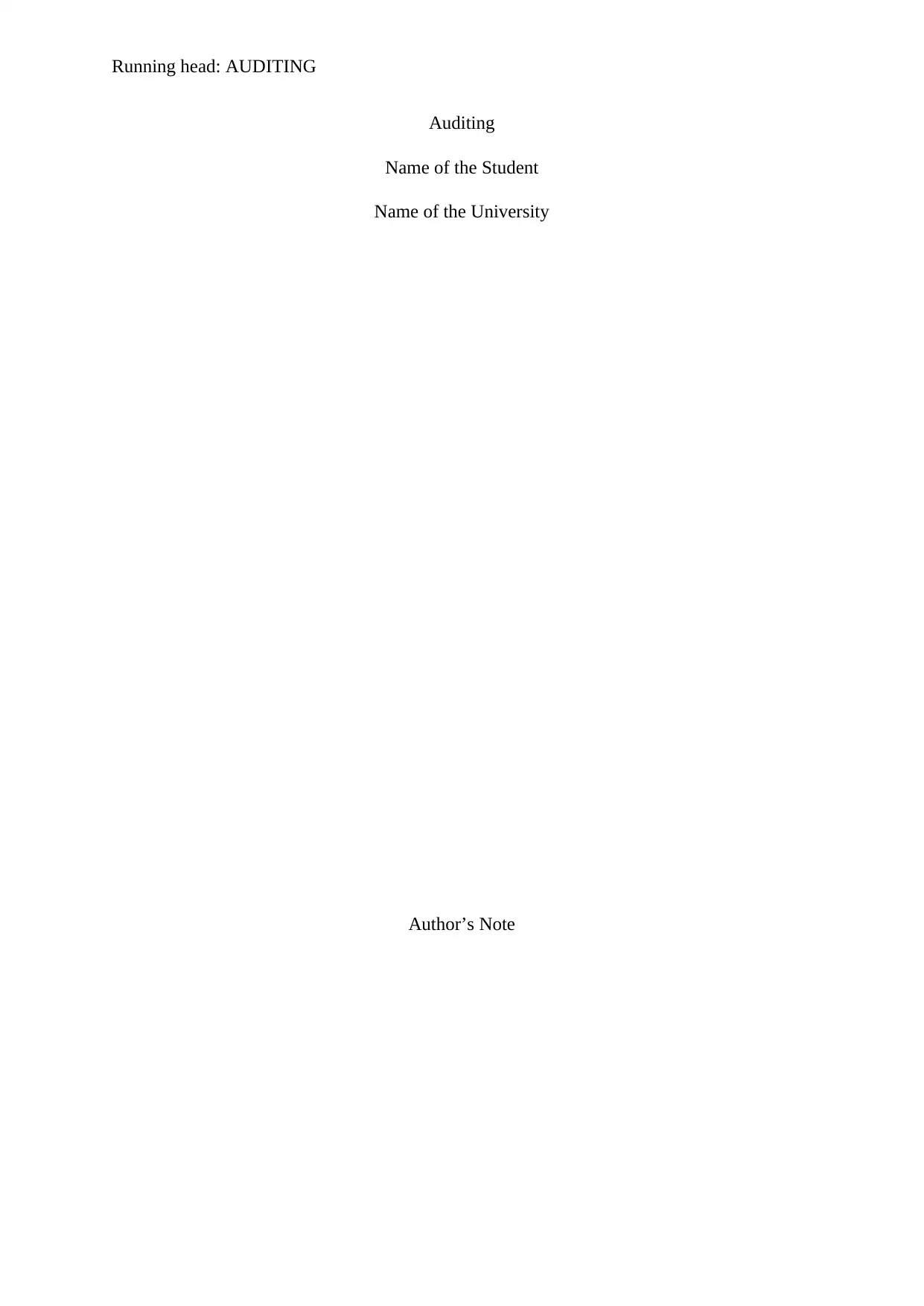
Running head: AUDITING
Auditing
Name of the Student
Name of the University
Author’s Note
Auditing
Name of the Student
Name of the University
Author’s Note
Paraphrase This Document
Need a fresh take? Get an instant paraphrase of this document with our AI Paraphraser
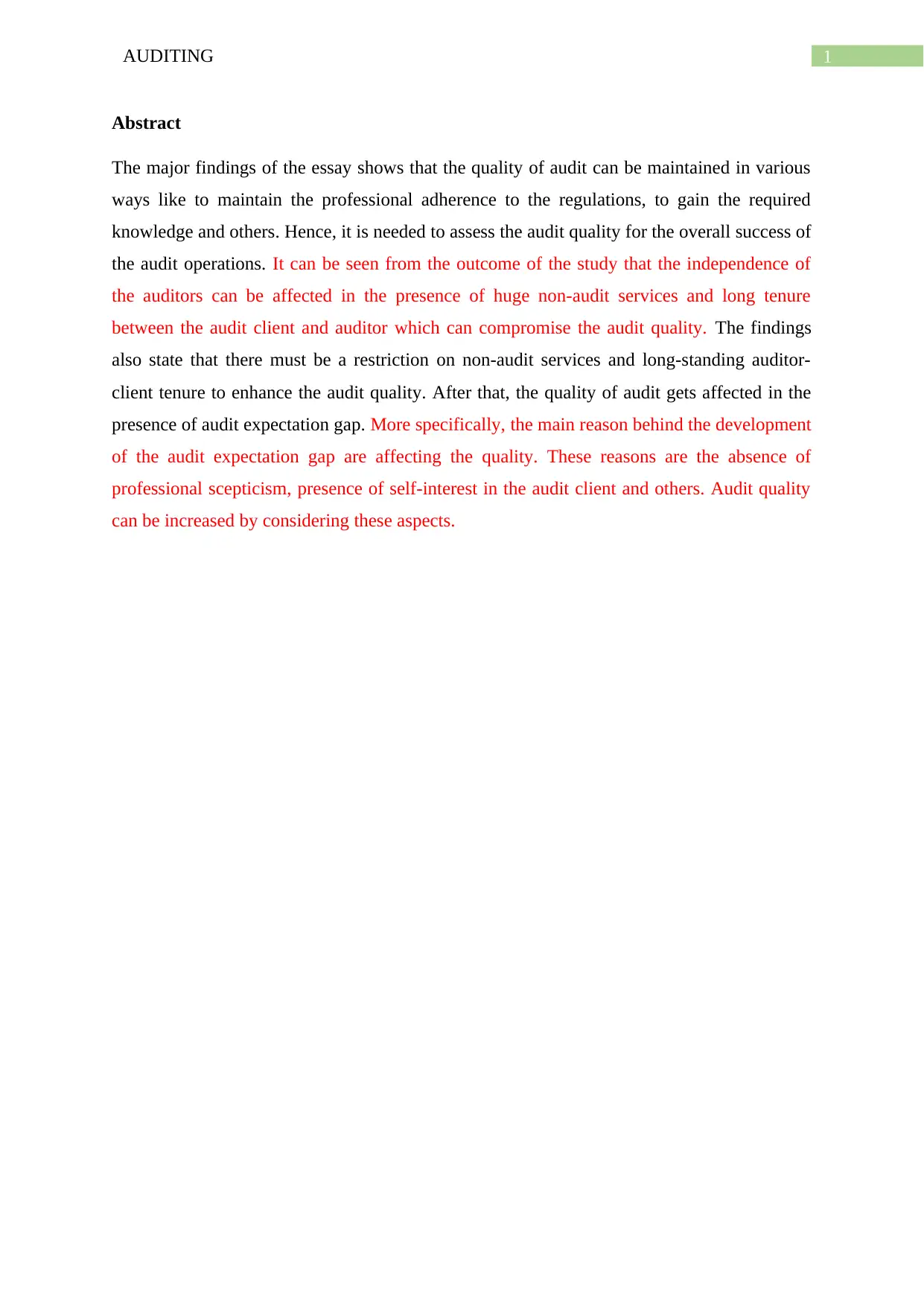
1AUDITING
Abstract
The major findings of the essay shows that the quality of audit can be maintained in various
ways like to maintain the professional adherence to the regulations, to gain the required
knowledge and others. Hence, it is needed to assess the audit quality for the overall success of
the audit operations. It can be seen from the outcome of the study that the independence of
the auditors can be affected in the presence of huge non-audit services and long tenure
between the audit client and auditor which can compromise the audit quality. The findings
also state that there must be a restriction on non-audit services and long-standing auditor-
client tenure to enhance the audit quality. After that, the quality of audit gets affected in the
presence of audit expectation gap. More specifically, the main reason behind the development
of the audit expectation gap are affecting the quality. These reasons are the absence of
professional scepticism, presence of self-interest in the audit client and others. Audit quality
can be increased by considering these aspects.
Abstract
The major findings of the essay shows that the quality of audit can be maintained in various
ways like to maintain the professional adherence to the regulations, to gain the required
knowledge and others. Hence, it is needed to assess the audit quality for the overall success of
the audit operations. It can be seen from the outcome of the study that the independence of
the auditors can be affected in the presence of huge non-audit services and long tenure
between the audit client and auditor which can compromise the audit quality. The findings
also state that there must be a restriction on non-audit services and long-standing auditor-
client tenure to enhance the audit quality. After that, the quality of audit gets affected in the
presence of audit expectation gap. More specifically, the main reason behind the development
of the audit expectation gap are affecting the quality. These reasons are the absence of
professional scepticism, presence of self-interest in the audit client and others. Audit quality
can be increased by considering these aspects.
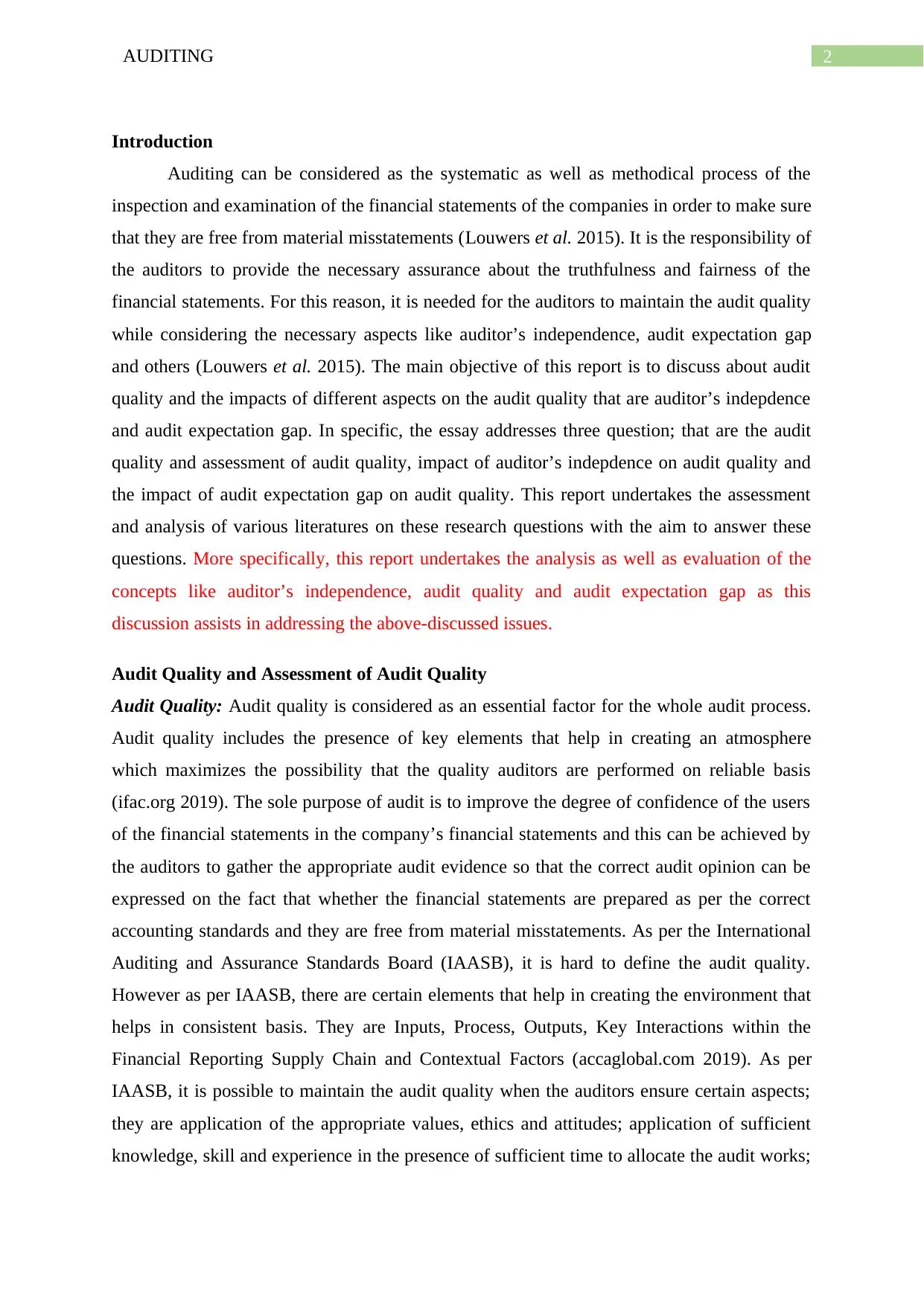
2AUDITING
Introduction
Auditing can be considered as the systematic as well as methodical process of the
inspection and examination of the financial statements of the companies in order to make sure
that they are free from material misstatements (Louwers et al. 2015). It is the responsibility of
the auditors to provide the necessary assurance about the truthfulness and fairness of the
financial statements. For this reason, it is needed for the auditors to maintain the audit quality
while considering the necessary aspects like auditor’s independence, audit expectation gap
and others (Louwers et al. 2015). The main objective of this report is to discuss about audit
quality and the impacts of different aspects on the audit quality that are auditor’s indepdence
and audit expectation gap. In specific, the essay addresses three question; that are the audit
quality and assessment of audit quality, impact of auditor’s indepdence on audit quality and
the impact of audit expectation gap on audit quality. This report undertakes the assessment
and analysis of various literatures on these research questions with the aim to answer these
questions. More specifically, this report undertakes the analysis as well as evaluation of the
concepts like auditor’s independence, audit quality and audit expectation gap as this
discussion assists in addressing the above-discussed issues.
Audit Quality and Assessment of Audit Quality
Audit Quality: Audit quality is considered as an essential factor for the whole audit process.
Audit quality includes the presence of key elements that help in creating an atmosphere
which maximizes the possibility that the quality auditors are performed on reliable basis
(ifac.org 2019). The sole purpose of audit is to improve the degree of confidence of the users
of the financial statements in the company’s financial statements and this can be achieved by
the auditors to gather the appropriate audit evidence so that the correct audit opinion can be
expressed on the fact that whether the financial statements are prepared as per the correct
accounting standards and they are free from material misstatements. As per the International
Auditing and Assurance Standards Board (IAASB), it is hard to define the audit quality.
However as per IAASB, there are certain elements that help in creating the environment that
helps in consistent basis. They are Inputs, Process, Outputs, Key Interactions within the
Financial Reporting Supply Chain and Contextual Factors (accaglobal.com 2019). As per
IAASB, it is possible to maintain the audit quality when the auditors ensure certain aspects;
they are application of the appropriate values, ethics and attitudes; application of sufficient
knowledge, skill and experience in the presence of sufficient time to allocate the audit works;
Introduction
Auditing can be considered as the systematic as well as methodical process of the
inspection and examination of the financial statements of the companies in order to make sure
that they are free from material misstatements (Louwers et al. 2015). It is the responsibility of
the auditors to provide the necessary assurance about the truthfulness and fairness of the
financial statements. For this reason, it is needed for the auditors to maintain the audit quality
while considering the necessary aspects like auditor’s independence, audit expectation gap
and others (Louwers et al. 2015). The main objective of this report is to discuss about audit
quality and the impacts of different aspects on the audit quality that are auditor’s indepdence
and audit expectation gap. In specific, the essay addresses three question; that are the audit
quality and assessment of audit quality, impact of auditor’s indepdence on audit quality and
the impact of audit expectation gap on audit quality. This report undertakes the assessment
and analysis of various literatures on these research questions with the aim to answer these
questions. More specifically, this report undertakes the analysis as well as evaluation of the
concepts like auditor’s independence, audit quality and audit expectation gap as this
discussion assists in addressing the above-discussed issues.
Audit Quality and Assessment of Audit Quality
Audit Quality: Audit quality is considered as an essential factor for the whole audit process.
Audit quality includes the presence of key elements that help in creating an atmosphere
which maximizes the possibility that the quality auditors are performed on reliable basis
(ifac.org 2019). The sole purpose of audit is to improve the degree of confidence of the users
of the financial statements in the company’s financial statements and this can be achieved by
the auditors to gather the appropriate audit evidence so that the correct audit opinion can be
expressed on the fact that whether the financial statements are prepared as per the correct
accounting standards and they are free from material misstatements. As per the International
Auditing and Assurance Standards Board (IAASB), it is hard to define the audit quality.
However as per IAASB, there are certain elements that help in creating the environment that
helps in consistent basis. They are Inputs, Process, Outputs, Key Interactions within the
Financial Reporting Supply Chain and Contextual Factors (accaglobal.com 2019). As per
IAASB, it is possible to maintain the audit quality when the auditors ensure certain aspects;
they are application of the appropriate values, ethics and attitudes; application of sufficient
knowledge, skill and experience in the presence of sufficient time to allocate the audit works;
⊘ This is a preview!⊘
Do you want full access?
Subscribe today to unlock all pages.

Trusted by 1+ million students worldwide
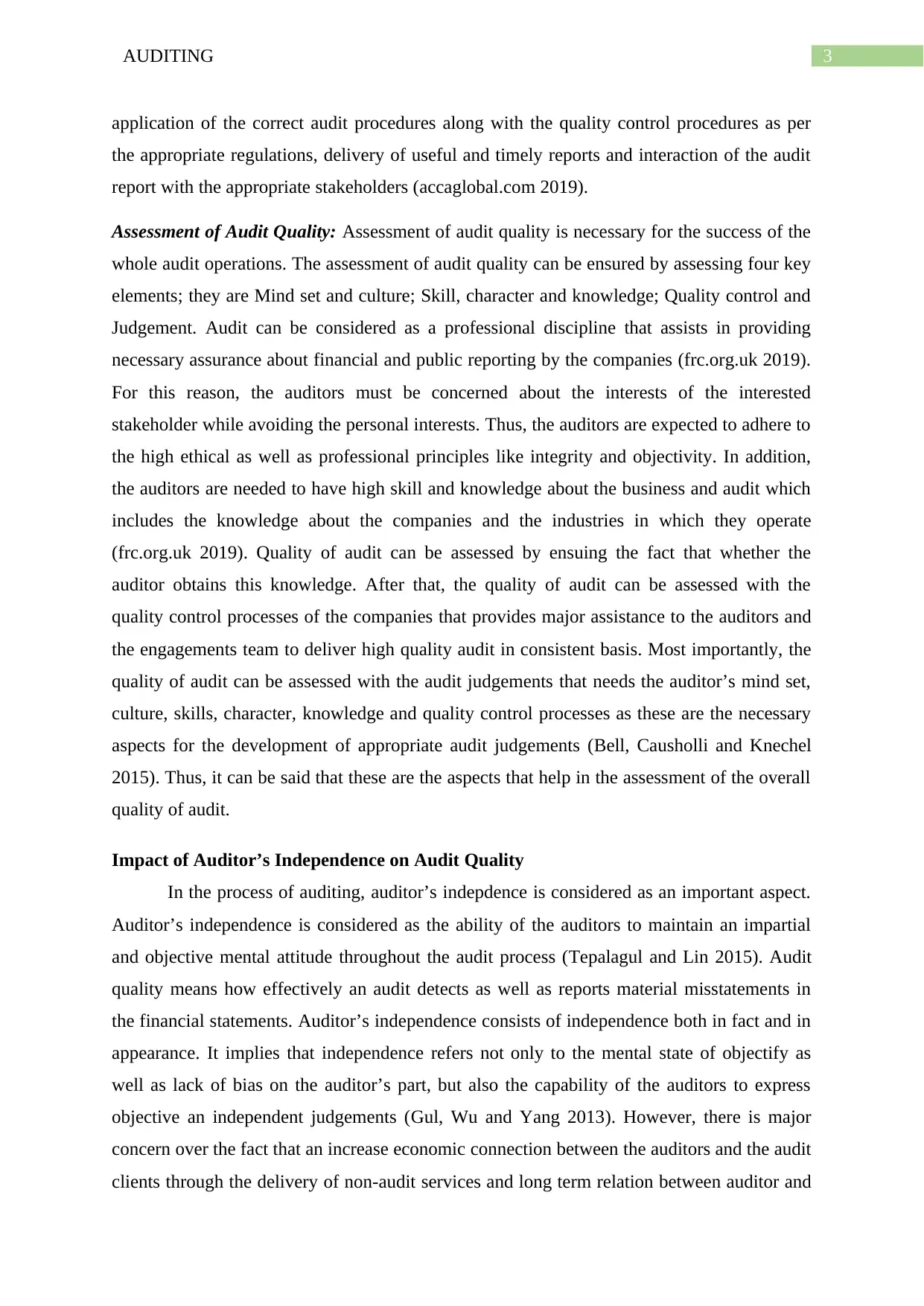
3AUDITING
application of the correct audit procedures along with the quality control procedures as per
the appropriate regulations, delivery of useful and timely reports and interaction of the audit
report with the appropriate stakeholders (accaglobal.com 2019).
Assessment of Audit Quality: Assessment of audit quality is necessary for the success of the
whole audit operations. The assessment of audit quality can be ensured by assessing four key
elements; they are Mind set and culture; Skill, character and knowledge; Quality control and
Judgement. Audit can be considered as a professional discipline that assists in providing
necessary assurance about financial and public reporting by the companies (frc.org.uk 2019).
For this reason, the auditors must be concerned about the interests of the interested
stakeholder while avoiding the personal interests. Thus, the auditors are expected to adhere to
the high ethical as well as professional principles like integrity and objectivity. In addition,
the auditors are needed to have high skill and knowledge about the business and audit which
includes the knowledge about the companies and the industries in which they operate
(frc.org.uk 2019). Quality of audit can be assessed by ensuing the fact that whether the
auditor obtains this knowledge. After that, the quality of audit can be assessed with the
quality control processes of the companies that provides major assistance to the auditors and
the engagements team to deliver high quality audit in consistent basis. Most importantly, the
quality of audit can be assessed with the audit judgements that needs the auditor’s mind set,
culture, skills, character, knowledge and quality control processes as these are the necessary
aspects for the development of appropriate audit judgements (Bell, Causholli and Knechel
2015). Thus, it can be said that these are the aspects that help in the assessment of the overall
quality of audit.
Impact of Auditor’s Independence on Audit Quality
In the process of auditing, auditor’s indepdence is considered as an important aspect.
Auditor’s independence is considered as the ability of the auditors to maintain an impartial
and objective mental attitude throughout the audit process (Tepalagul and Lin 2015). Audit
quality means how effectively an audit detects as well as reports material misstatements in
the financial statements. Auditor’s independence consists of independence both in fact and in
appearance. It implies that independence refers not only to the mental state of objectify as
well as lack of bias on the auditor’s part, but also the capability of the auditors to express
objective an independent judgements (Gul, Wu and Yang 2013). However, there is major
concern over the fact that an increase economic connection between the auditors and the audit
clients through the delivery of non-audit services and long term relation between auditor and
application of the correct audit procedures along with the quality control procedures as per
the appropriate regulations, delivery of useful and timely reports and interaction of the audit
report with the appropriate stakeholders (accaglobal.com 2019).
Assessment of Audit Quality: Assessment of audit quality is necessary for the success of the
whole audit operations. The assessment of audit quality can be ensured by assessing four key
elements; they are Mind set and culture; Skill, character and knowledge; Quality control and
Judgement. Audit can be considered as a professional discipline that assists in providing
necessary assurance about financial and public reporting by the companies (frc.org.uk 2019).
For this reason, the auditors must be concerned about the interests of the interested
stakeholder while avoiding the personal interests. Thus, the auditors are expected to adhere to
the high ethical as well as professional principles like integrity and objectivity. In addition,
the auditors are needed to have high skill and knowledge about the business and audit which
includes the knowledge about the companies and the industries in which they operate
(frc.org.uk 2019). Quality of audit can be assessed by ensuing the fact that whether the
auditor obtains this knowledge. After that, the quality of audit can be assessed with the
quality control processes of the companies that provides major assistance to the auditors and
the engagements team to deliver high quality audit in consistent basis. Most importantly, the
quality of audit can be assessed with the audit judgements that needs the auditor’s mind set,
culture, skills, character, knowledge and quality control processes as these are the necessary
aspects for the development of appropriate audit judgements (Bell, Causholli and Knechel
2015). Thus, it can be said that these are the aspects that help in the assessment of the overall
quality of audit.
Impact of Auditor’s Independence on Audit Quality
In the process of auditing, auditor’s indepdence is considered as an important aspect.
Auditor’s independence is considered as the ability of the auditors to maintain an impartial
and objective mental attitude throughout the audit process (Tepalagul and Lin 2015). Audit
quality means how effectively an audit detects as well as reports material misstatements in
the financial statements. Auditor’s independence consists of independence both in fact and in
appearance. It implies that independence refers not only to the mental state of objectify as
well as lack of bias on the auditor’s part, but also the capability of the auditors to express
objective an independent judgements (Gul, Wu and Yang 2013). However, there is major
concern over the fact that an increase economic connection between the auditors and the audit
clients through the delivery of non-audit services and long term relation between auditor and
Paraphrase This Document
Need a fresh take? Get an instant paraphrase of this document with our AI Paraphraser
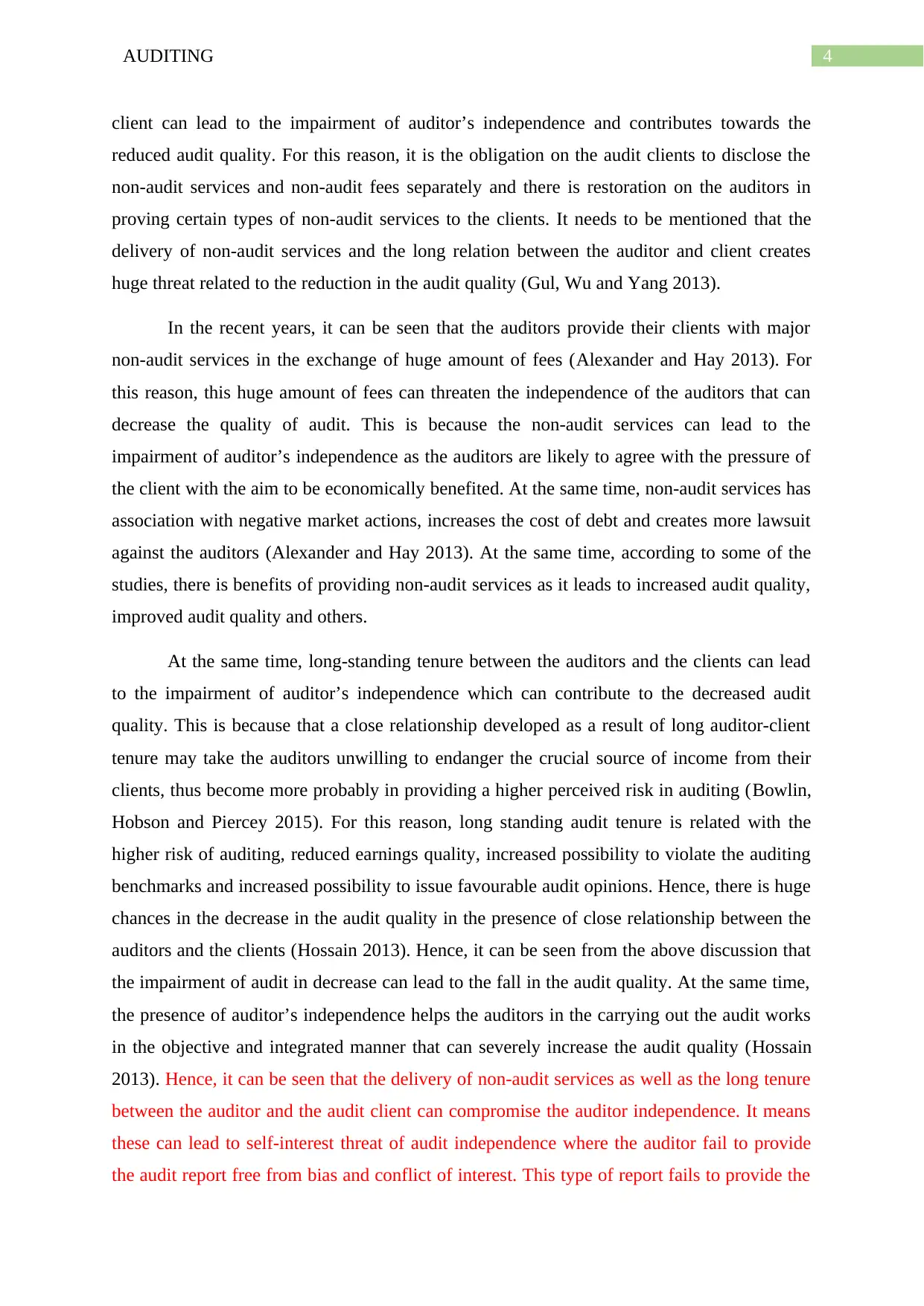
4AUDITING
client can lead to the impairment of auditor’s independence and contributes towards the
reduced audit quality. For this reason, it is the obligation on the audit clients to disclose the
non-audit services and non-audit fees separately and there is restoration on the auditors in
proving certain types of non-audit services to the clients. It needs to be mentioned that the
delivery of non-audit services and the long relation between the auditor and client creates
huge threat related to the reduction in the audit quality (Gul, Wu and Yang 2013).
In the recent years, it can be seen that the auditors provide their clients with major
non-audit services in the exchange of huge amount of fees (Alexander and Hay 2013). For
this reason, this huge amount of fees can threaten the independence of the auditors that can
decrease the quality of audit. This is because the non-audit services can lead to the
impairment of auditor’s independence as the auditors are likely to agree with the pressure of
the client with the aim to be economically benefited. At the same time, non-audit services has
association with negative market actions, increases the cost of debt and creates more lawsuit
against the auditors (Alexander and Hay 2013). At the same time, according to some of the
studies, there is benefits of providing non-audit services as it leads to increased audit quality,
improved audit quality and others.
At the same time, long-standing tenure between the auditors and the clients can lead
to the impairment of auditor’s independence which can contribute to the decreased audit
quality. This is because that a close relationship developed as a result of long auditor-client
tenure may take the auditors unwilling to endanger the crucial source of income from their
clients, thus become more probably in providing a higher perceived risk in auditing (Bowlin,
Hobson and Piercey 2015). For this reason, long standing audit tenure is related with the
higher risk of auditing, reduced earnings quality, increased possibility to violate the auditing
benchmarks and increased possibility to issue favourable audit opinions. Hence, there is huge
chances in the decrease in the audit quality in the presence of close relationship between the
auditors and the clients (Hossain 2013). Hence, it can be seen from the above discussion that
the impairment of audit in decrease can lead to the fall in the audit quality. At the same time,
the presence of auditor’s independence helps the auditors in the carrying out the audit works
in the objective and integrated manner that can severely increase the audit quality (Hossain
2013). Hence, it can be seen that the delivery of non-audit services as well as the long tenure
between the auditor and the audit client can compromise the auditor independence. It means
these can lead to self-interest threat of audit independence where the auditor fail to provide
the audit report free from bias and conflict of interest. This type of report fails to provide the
client can lead to the impairment of auditor’s independence and contributes towards the
reduced audit quality. For this reason, it is the obligation on the audit clients to disclose the
non-audit services and non-audit fees separately and there is restoration on the auditors in
proving certain types of non-audit services to the clients. It needs to be mentioned that the
delivery of non-audit services and the long relation between the auditor and client creates
huge threat related to the reduction in the audit quality (Gul, Wu and Yang 2013).
In the recent years, it can be seen that the auditors provide their clients with major
non-audit services in the exchange of huge amount of fees (Alexander and Hay 2013). For
this reason, this huge amount of fees can threaten the independence of the auditors that can
decrease the quality of audit. This is because the non-audit services can lead to the
impairment of auditor’s independence as the auditors are likely to agree with the pressure of
the client with the aim to be economically benefited. At the same time, non-audit services has
association with negative market actions, increases the cost of debt and creates more lawsuit
against the auditors (Alexander and Hay 2013). At the same time, according to some of the
studies, there is benefits of providing non-audit services as it leads to increased audit quality,
improved audit quality and others.
At the same time, long-standing tenure between the auditors and the clients can lead
to the impairment of auditor’s independence which can contribute to the decreased audit
quality. This is because that a close relationship developed as a result of long auditor-client
tenure may take the auditors unwilling to endanger the crucial source of income from their
clients, thus become more probably in providing a higher perceived risk in auditing (Bowlin,
Hobson and Piercey 2015). For this reason, long standing audit tenure is related with the
higher risk of auditing, reduced earnings quality, increased possibility to violate the auditing
benchmarks and increased possibility to issue favourable audit opinions. Hence, there is huge
chances in the decrease in the audit quality in the presence of close relationship between the
auditors and the clients (Hossain 2013). Hence, it can be seen from the above discussion that
the impairment of audit in decrease can lead to the fall in the audit quality. At the same time,
the presence of auditor’s independence helps the auditors in the carrying out the audit works
in the objective and integrated manner that can severely increase the audit quality (Hossain
2013). Hence, it can be seen that the delivery of non-audit services as well as the long tenure
between the auditor and the audit client can compromise the auditor independence. It means
these can lead to self-interest threat of audit independence where the auditor fail to provide
the audit report free from bias and conflict of interest. This type of report fails to provide the
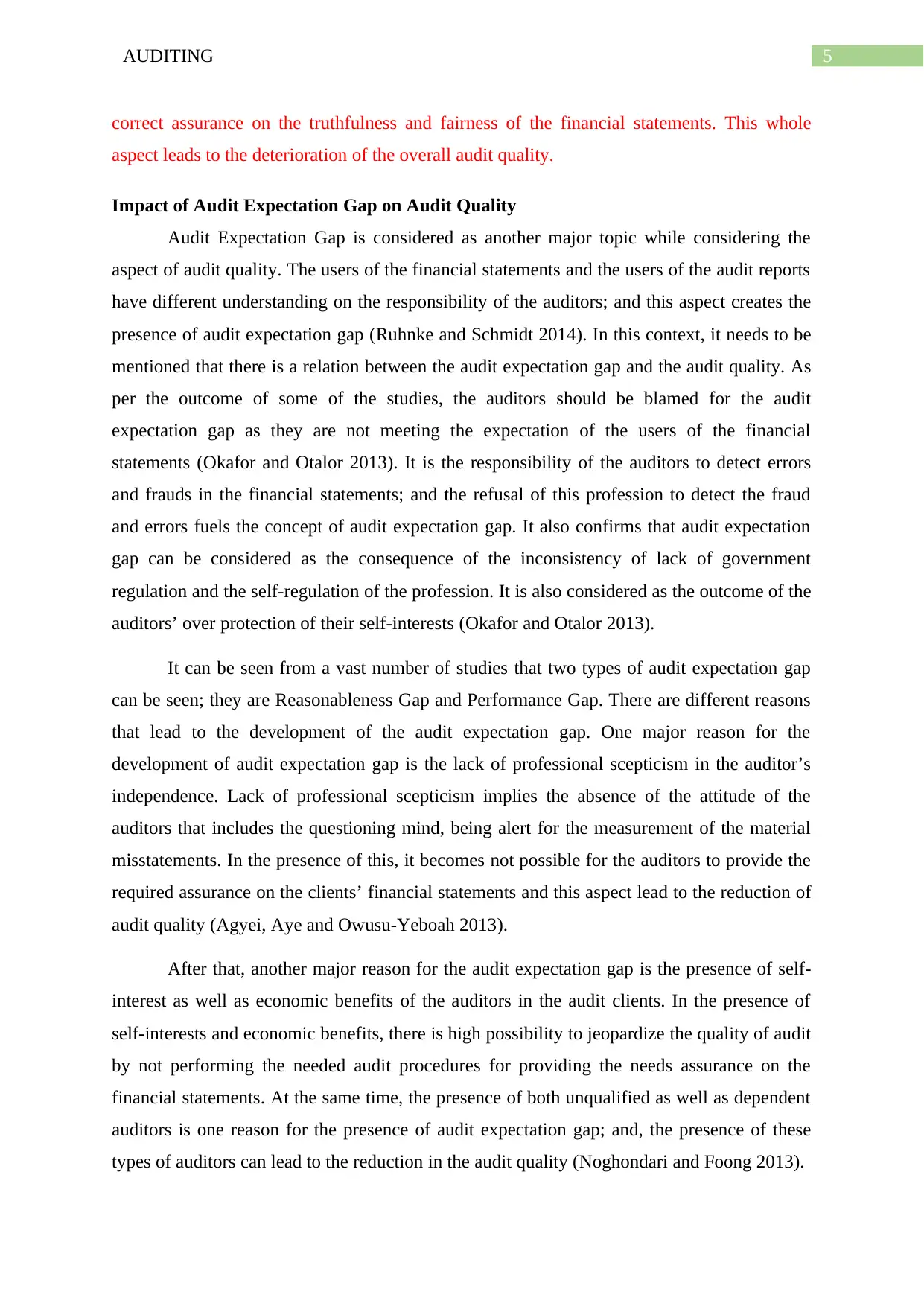
5AUDITING
correct assurance on the truthfulness and fairness of the financial statements. This whole
aspect leads to the deterioration of the overall audit quality.
Impact of Audit Expectation Gap on Audit Quality
Audit Expectation Gap is considered as another major topic while considering the
aspect of audit quality. The users of the financial statements and the users of the audit reports
have different understanding on the responsibility of the auditors; and this aspect creates the
presence of audit expectation gap (Ruhnke and Schmidt 2014). In this context, it needs to be
mentioned that there is a relation between the audit expectation gap and the audit quality. As
per the outcome of some of the studies, the auditors should be blamed for the audit
expectation gap as they are not meeting the expectation of the users of the financial
statements (Okafor and Otalor 2013). It is the responsibility of the auditors to detect errors
and frauds in the financial statements; and the refusal of this profession to detect the fraud
and errors fuels the concept of audit expectation gap. It also confirms that audit expectation
gap can be considered as the consequence of the inconsistency of lack of government
regulation and the self-regulation of the profession. It is also considered as the outcome of the
auditors’ over protection of their self-interests (Okafor and Otalor 2013).
It can be seen from a vast number of studies that two types of audit expectation gap
can be seen; they are Reasonableness Gap and Performance Gap. There are different reasons
that lead to the development of the audit expectation gap. One major reason for the
development of audit expectation gap is the lack of professional scepticism in the auditor’s
independence. Lack of professional scepticism implies the absence of the attitude of the
auditors that includes the questioning mind, being alert for the measurement of the material
misstatements. In the presence of this, it becomes not possible for the auditors to provide the
required assurance on the clients’ financial statements and this aspect lead to the reduction of
audit quality (Agyei, Aye and Owusu-Yeboah 2013).
After that, another major reason for the audit expectation gap is the presence of self-
interest as well as economic benefits of the auditors in the audit clients. In the presence of
self-interests and economic benefits, there is high possibility to jeopardize the quality of audit
by not performing the needed audit procedures for providing the needs assurance on the
financial statements. At the same time, the presence of both unqualified as well as dependent
auditors is one reason for the presence of audit expectation gap; and, the presence of these
types of auditors can lead to the reduction in the audit quality (Noghondari and Foong 2013).
correct assurance on the truthfulness and fairness of the financial statements. This whole
aspect leads to the deterioration of the overall audit quality.
Impact of Audit Expectation Gap on Audit Quality
Audit Expectation Gap is considered as another major topic while considering the
aspect of audit quality. The users of the financial statements and the users of the audit reports
have different understanding on the responsibility of the auditors; and this aspect creates the
presence of audit expectation gap (Ruhnke and Schmidt 2014). In this context, it needs to be
mentioned that there is a relation between the audit expectation gap and the audit quality. As
per the outcome of some of the studies, the auditors should be blamed for the audit
expectation gap as they are not meeting the expectation of the users of the financial
statements (Okafor and Otalor 2013). It is the responsibility of the auditors to detect errors
and frauds in the financial statements; and the refusal of this profession to detect the fraud
and errors fuels the concept of audit expectation gap. It also confirms that audit expectation
gap can be considered as the consequence of the inconsistency of lack of government
regulation and the self-regulation of the profession. It is also considered as the outcome of the
auditors’ over protection of their self-interests (Okafor and Otalor 2013).
It can be seen from a vast number of studies that two types of audit expectation gap
can be seen; they are Reasonableness Gap and Performance Gap. There are different reasons
that lead to the development of the audit expectation gap. One major reason for the
development of audit expectation gap is the lack of professional scepticism in the auditor’s
independence. Lack of professional scepticism implies the absence of the attitude of the
auditors that includes the questioning mind, being alert for the measurement of the material
misstatements. In the presence of this, it becomes not possible for the auditors to provide the
required assurance on the clients’ financial statements and this aspect lead to the reduction of
audit quality (Agyei, Aye and Owusu-Yeboah 2013).
After that, another major reason for the audit expectation gap is the presence of self-
interest as well as economic benefits of the auditors in the audit clients. In the presence of
self-interests and economic benefits, there is high possibility to jeopardize the quality of audit
by not performing the needed audit procedures for providing the needs assurance on the
financial statements. At the same time, the presence of both unqualified as well as dependent
auditors is one reason for the presence of audit expectation gap; and, the presence of these
types of auditors can lead to the reduction in the audit quality (Noghondari and Foong 2013).
⊘ This is a preview!⊘
Do you want full access?
Subscribe today to unlock all pages.

Trusted by 1+ million students worldwide
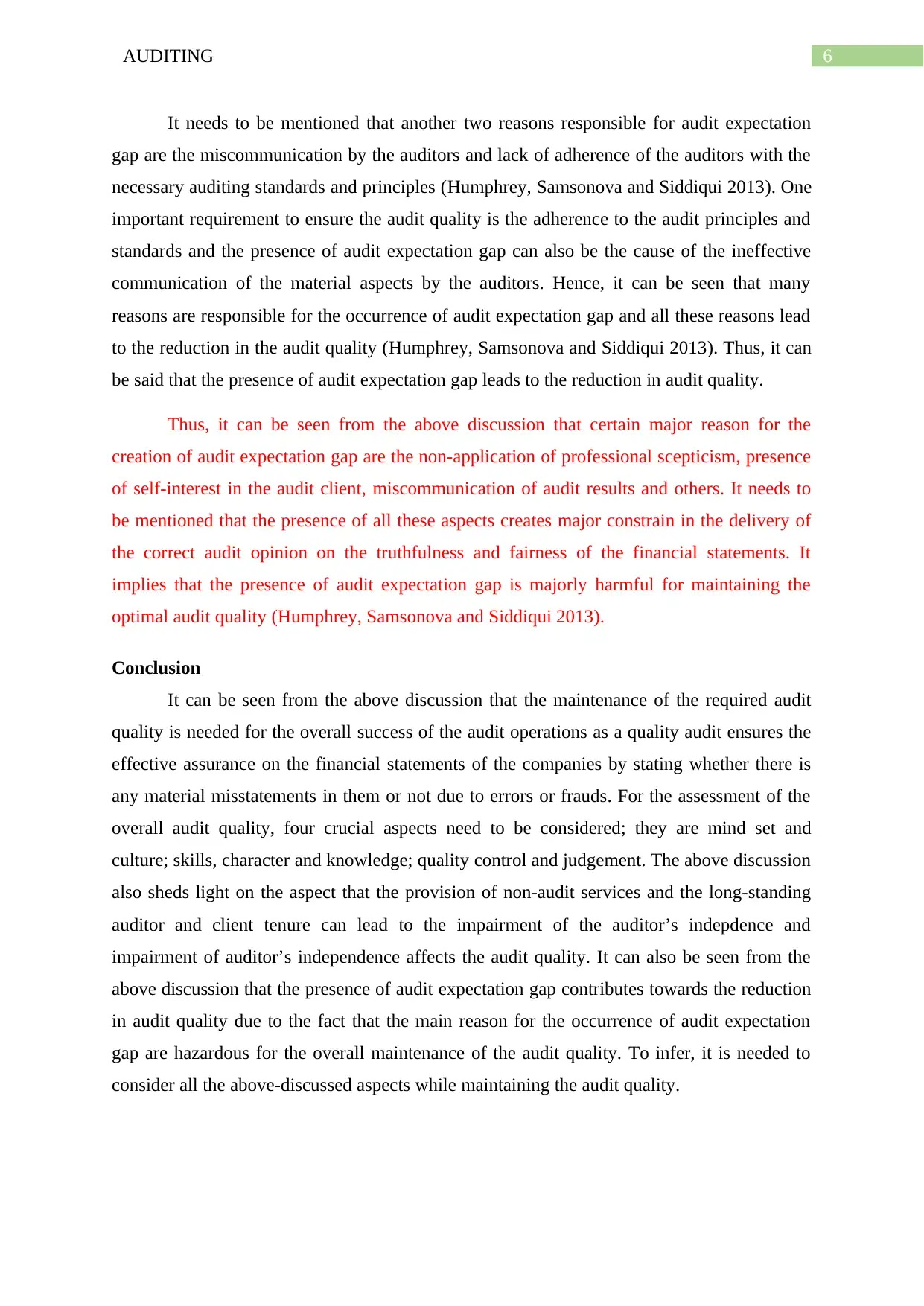
6AUDITING
It needs to be mentioned that another two reasons responsible for audit expectation
gap are the miscommunication by the auditors and lack of adherence of the auditors with the
necessary auditing standards and principles (Humphrey, Samsonova and Siddiqui 2013). One
important requirement to ensure the audit quality is the adherence to the audit principles and
standards and the presence of audit expectation gap can also be the cause of the ineffective
communication of the material aspects by the auditors. Hence, it can be seen that many
reasons are responsible for the occurrence of audit expectation gap and all these reasons lead
to the reduction in the audit quality (Humphrey, Samsonova and Siddiqui 2013). Thus, it can
be said that the presence of audit expectation gap leads to the reduction in audit quality.
Thus, it can be seen from the above discussion that certain major reason for the
creation of audit expectation gap are the non-application of professional scepticism, presence
of self-interest in the audit client, miscommunication of audit results and others. It needs to
be mentioned that the presence of all these aspects creates major constrain in the delivery of
the correct audit opinion on the truthfulness and fairness of the financial statements. It
implies that the presence of audit expectation gap is majorly harmful for maintaining the
optimal audit quality (Humphrey, Samsonova and Siddiqui 2013).
Conclusion
It can be seen from the above discussion that the maintenance of the required audit
quality is needed for the overall success of the audit operations as a quality audit ensures the
effective assurance on the financial statements of the companies by stating whether there is
any material misstatements in them or not due to errors or frauds. For the assessment of the
overall audit quality, four crucial aspects need to be considered; they are mind set and
culture; skills, character and knowledge; quality control and judgement. The above discussion
also sheds light on the aspect that the provision of non-audit services and the long-standing
auditor and client tenure can lead to the impairment of the auditor’s indepdence and
impairment of auditor’s independence affects the audit quality. It can also be seen from the
above discussion that the presence of audit expectation gap contributes towards the reduction
in audit quality due to the fact that the main reason for the occurrence of audit expectation
gap are hazardous for the overall maintenance of the audit quality. To infer, it is needed to
consider all the above-discussed aspects while maintaining the audit quality.
It needs to be mentioned that another two reasons responsible for audit expectation
gap are the miscommunication by the auditors and lack of adherence of the auditors with the
necessary auditing standards and principles (Humphrey, Samsonova and Siddiqui 2013). One
important requirement to ensure the audit quality is the adherence to the audit principles and
standards and the presence of audit expectation gap can also be the cause of the ineffective
communication of the material aspects by the auditors. Hence, it can be seen that many
reasons are responsible for the occurrence of audit expectation gap and all these reasons lead
to the reduction in the audit quality (Humphrey, Samsonova and Siddiqui 2013). Thus, it can
be said that the presence of audit expectation gap leads to the reduction in audit quality.
Thus, it can be seen from the above discussion that certain major reason for the
creation of audit expectation gap are the non-application of professional scepticism, presence
of self-interest in the audit client, miscommunication of audit results and others. It needs to
be mentioned that the presence of all these aspects creates major constrain in the delivery of
the correct audit opinion on the truthfulness and fairness of the financial statements. It
implies that the presence of audit expectation gap is majorly harmful for maintaining the
optimal audit quality (Humphrey, Samsonova and Siddiqui 2013).
Conclusion
It can be seen from the above discussion that the maintenance of the required audit
quality is needed for the overall success of the audit operations as a quality audit ensures the
effective assurance on the financial statements of the companies by stating whether there is
any material misstatements in them or not due to errors or frauds. For the assessment of the
overall audit quality, four crucial aspects need to be considered; they are mind set and
culture; skills, character and knowledge; quality control and judgement. The above discussion
also sheds light on the aspect that the provision of non-audit services and the long-standing
auditor and client tenure can lead to the impairment of the auditor’s indepdence and
impairment of auditor’s independence affects the audit quality. It can also be seen from the
above discussion that the presence of audit expectation gap contributes towards the reduction
in audit quality due to the fact that the main reason for the occurrence of audit expectation
gap are hazardous for the overall maintenance of the audit quality. To infer, it is needed to
consider all the above-discussed aspects while maintaining the audit quality.
Paraphrase This Document
Need a fresh take? Get an instant paraphrase of this document with our AI Paraphraser
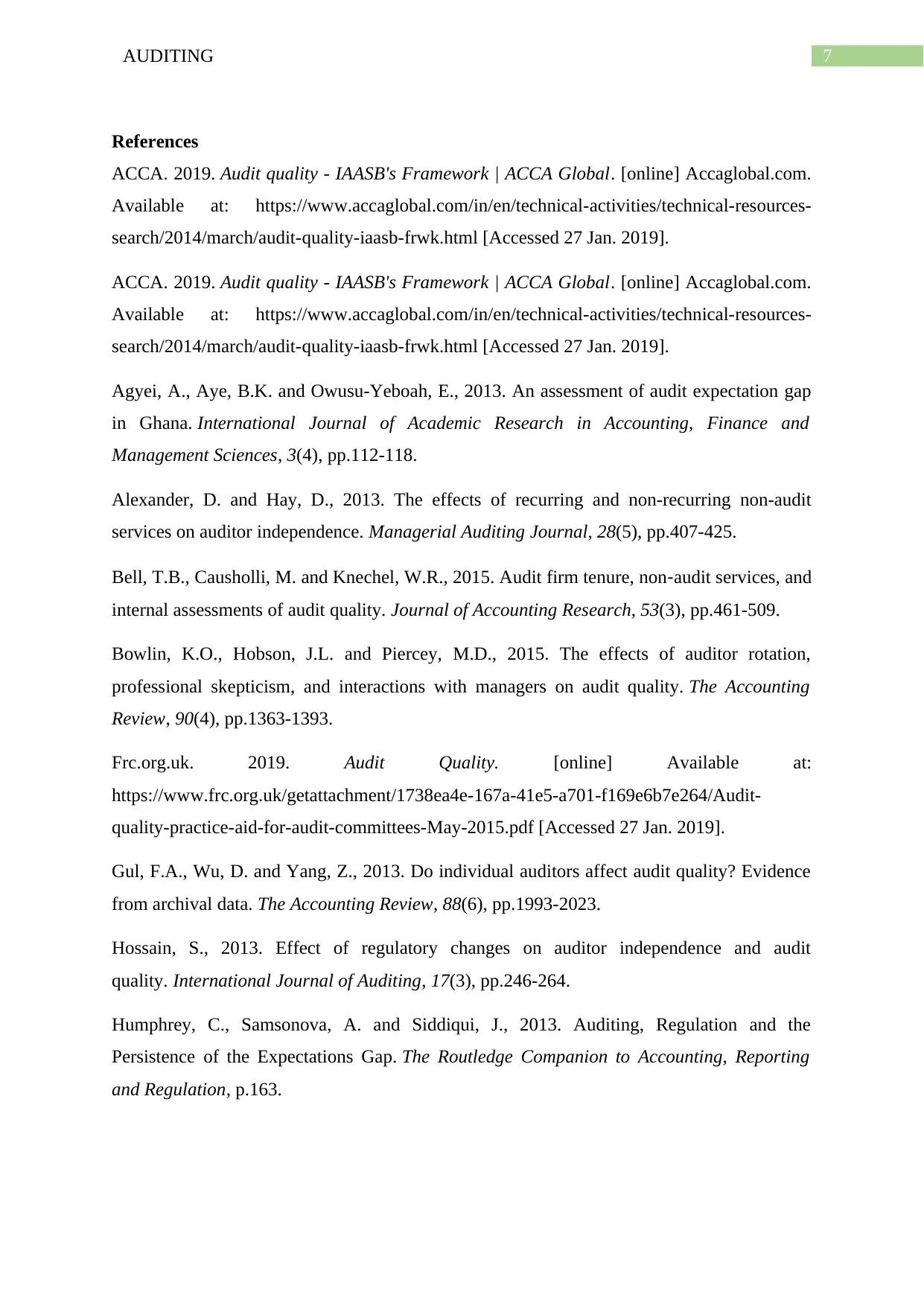
7AUDITING
References
ACCA. 2019. Audit quality - IAASB's Framework | ACCA Global. [online] Accaglobal.com.
Available at: https://www.accaglobal.com/in/en/technical-activities/technical-resources-
search/2014/march/audit-quality-iaasb-frwk.html [Accessed 27 Jan. 2019].
ACCA. 2019. Audit quality - IAASB's Framework | ACCA Global. [online] Accaglobal.com.
Available at: https://www.accaglobal.com/in/en/technical-activities/technical-resources-
search/2014/march/audit-quality-iaasb-frwk.html [Accessed 27 Jan. 2019].
Agyei, A., Aye, B.K. and Owusu-Yeboah, E., 2013. An assessment of audit expectation gap
in Ghana. International Journal of Academic Research in Accounting, Finance and
Management Sciences, 3(4), pp.112-118.
Alexander, D. and Hay, D., 2013. The effects of recurring and non-recurring non-audit
services on auditor independence. Managerial Auditing Journal, 28(5), pp.407-425.
Bell, T.B., Causholli, M. and Knechel, W.R., 2015. Audit firm tenure, non‐audit services, and
internal assessments of audit quality. Journal of Accounting Research, 53(3), pp.461-509.
Bowlin, K.O., Hobson, J.L. and Piercey, M.D., 2015. The effects of auditor rotation,
professional skepticism, and interactions with managers on audit quality. The Accounting
Review, 90(4), pp.1363-1393.
Frc.org.uk. 2019. Audit Quality. [online] Available at:
https://www.frc.org.uk/getattachment/1738ea4e-167a-41e5-a701-f169e6b7e264/Audit-
quality-practice-aid-for-audit-committees-May-2015.pdf [Accessed 27 Jan. 2019].
Gul, F.A., Wu, D. and Yang, Z., 2013. Do individual auditors affect audit quality? Evidence
from archival data. The Accounting Review, 88(6), pp.1993-2023.
Hossain, S., 2013. Effect of regulatory changes on auditor independence and audit
quality. International Journal of Auditing, 17(3), pp.246-264.
Humphrey, C., Samsonova, A. and Siddiqui, J., 2013. Auditing, Regulation and the
Persistence of the Expectations Gap. The Routledge Companion to Accounting, Reporting
and Regulation, p.163.
References
ACCA. 2019. Audit quality - IAASB's Framework | ACCA Global. [online] Accaglobal.com.
Available at: https://www.accaglobal.com/in/en/technical-activities/technical-resources-
search/2014/march/audit-quality-iaasb-frwk.html [Accessed 27 Jan. 2019].
ACCA. 2019. Audit quality - IAASB's Framework | ACCA Global. [online] Accaglobal.com.
Available at: https://www.accaglobal.com/in/en/technical-activities/technical-resources-
search/2014/march/audit-quality-iaasb-frwk.html [Accessed 27 Jan. 2019].
Agyei, A., Aye, B.K. and Owusu-Yeboah, E., 2013. An assessment of audit expectation gap
in Ghana. International Journal of Academic Research in Accounting, Finance and
Management Sciences, 3(4), pp.112-118.
Alexander, D. and Hay, D., 2013. The effects of recurring and non-recurring non-audit
services on auditor independence. Managerial Auditing Journal, 28(5), pp.407-425.
Bell, T.B., Causholli, M. and Knechel, W.R., 2015. Audit firm tenure, non‐audit services, and
internal assessments of audit quality. Journal of Accounting Research, 53(3), pp.461-509.
Bowlin, K.O., Hobson, J.L. and Piercey, M.D., 2015. The effects of auditor rotation,
professional skepticism, and interactions with managers on audit quality. The Accounting
Review, 90(4), pp.1363-1393.
Frc.org.uk. 2019. Audit Quality. [online] Available at:
https://www.frc.org.uk/getattachment/1738ea4e-167a-41e5-a701-f169e6b7e264/Audit-
quality-practice-aid-for-audit-committees-May-2015.pdf [Accessed 27 Jan. 2019].
Gul, F.A., Wu, D. and Yang, Z., 2013. Do individual auditors affect audit quality? Evidence
from archival data. The Accounting Review, 88(6), pp.1993-2023.
Hossain, S., 2013. Effect of regulatory changes on auditor independence and audit
quality. International Journal of Auditing, 17(3), pp.246-264.
Humphrey, C., Samsonova, A. and Siddiqui, J., 2013. Auditing, Regulation and the
Persistence of the Expectations Gap. The Routledge Companion to Accounting, Reporting
and Regulation, p.163.
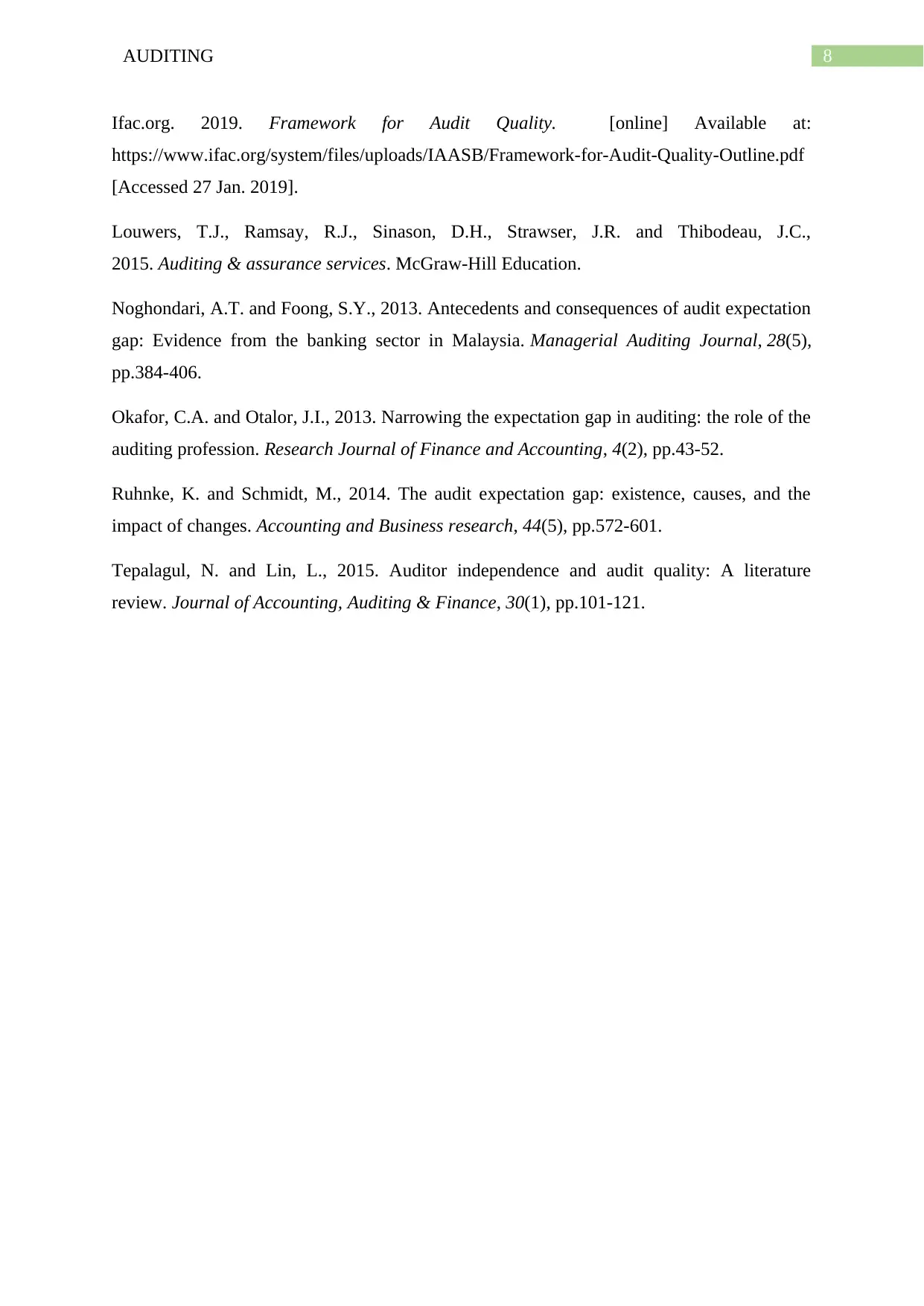
8AUDITING
Ifac.org. 2019. Framework for Audit Quality. [online] Available at:
https://www.ifac.org/system/files/uploads/IAASB/Framework-for-Audit-Quality-Outline.pdf
[Accessed 27 Jan. 2019].
Louwers, T.J., Ramsay, R.J., Sinason, D.H., Strawser, J.R. and Thibodeau, J.C.,
2015. Auditing & assurance services. McGraw-Hill Education.
Noghondari, A.T. and Foong, S.Y., 2013. Antecedents and consequences of audit expectation
gap: Evidence from the banking sector in Malaysia. Managerial Auditing Journal, 28(5),
pp.384-406.
Okafor, C.A. and Otalor, J.I., 2013. Narrowing the expectation gap in auditing: the role of the
auditing profession. Research Journal of Finance and Accounting, 4(2), pp.43-52.
Ruhnke, K. and Schmidt, M., 2014. The audit expectation gap: existence, causes, and the
impact of changes. Accounting and Business research, 44(5), pp.572-601.
Tepalagul, N. and Lin, L., 2015. Auditor independence and audit quality: A literature
review. Journal of Accounting, Auditing & Finance, 30(1), pp.101-121.
Ifac.org. 2019. Framework for Audit Quality. [online] Available at:
https://www.ifac.org/system/files/uploads/IAASB/Framework-for-Audit-Quality-Outline.pdf
[Accessed 27 Jan. 2019].
Louwers, T.J., Ramsay, R.J., Sinason, D.H., Strawser, J.R. and Thibodeau, J.C.,
2015. Auditing & assurance services. McGraw-Hill Education.
Noghondari, A.T. and Foong, S.Y., 2013. Antecedents and consequences of audit expectation
gap: Evidence from the banking sector in Malaysia. Managerial Auditing Journal, 28(5),
pp.384-406.
Okafor, C.A. and Otalor, J.I., 2013. Narrowing the expectation gap in auditing: the role of the
auditing profession. Research Journal of Finance and Accounting, 4(2), pp.43-52.
Ruhnke, K. and Schmidt, M., 2014. The audit expectation gap: existence, causes, and the
impact of changes. Accounting and Business research, 44(5), pp.572-601.
Tepalagul, N. and Lin, L., 2015. Auditor independence and audit quality: A literature
review. Journal of Accounting, Auditing & Finance, 30(1), pp.101-121.
⊘ This is a preview!⊘
Do you want full access?
Subscribe today to unlock all pages.

Trusted by 1+ million students worldwide
1 out of 9
Related Documents
Your All-in-One AI-Powered Toolkit for Academic Success.
+13062052269
info@desklib.com
Available 24*7 on WhatsApp / Email
![[object Object]](/_next/static/media/star-bottom.7253800d.svg)
Unlock your academic potential
Copyright © 2020–2026 A2Z Services. All Rights Reserved. Developed and managed by ZUCOL.





